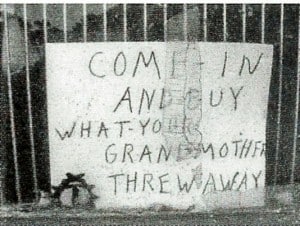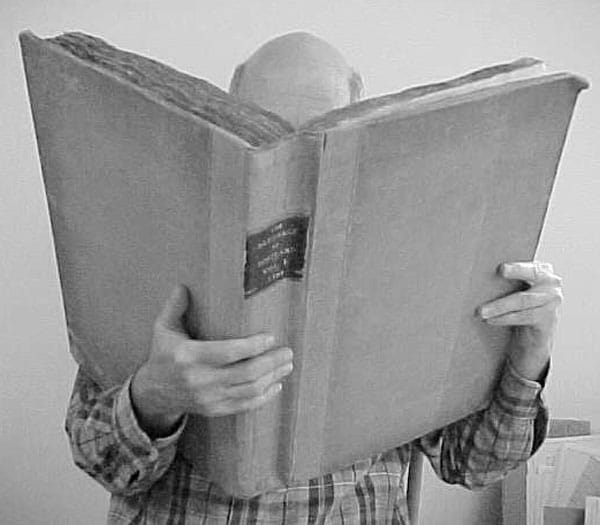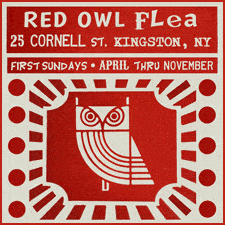Collecting Old & Rare Books: Grandma’s Old Books – The Journal of Antiques and Collectibles – August 2012

by James Dawson
One of my favorite bookshops ever was on Route 50 a few miles south of Cambridge, Maryland. Don’t look for it now, because it is long gone, but I used to see it from the back seat of my parents Buick as we sped by it on our way to somewhere else. The sign painted on a small, two story cinder block building proclaimed “Mill’s Treasures & Trash” on the front and “Antiques and Old Books” on the side. Two lights on either side of the front door winked invitingly (that was how you knew it was open). I was too young to know anything about collectibles then, but something about the place intrigued me even then and I couldn’t wait to get inside.
I never asked my parents to stop there because I knew they weren’t interested in such things, but you can guess where I went as soon as I got my driver’s license. I can truthfully say I know how Howard Carter felt when he first stepped into King Tut’s tomb. Someone asked him what was inside and all he could stammer out was “wonderful things.” Well, Mills’ Treasures and Trash was exactly like King Tut’s tomb if Tut’s tomb had been filled with teetering stacks of old plates, rusty tools, Shirley Temple mugs, old books, 78 RPM records, and racks of 1950s comic postcards showing people posing next to watermelons the size of commercial sized propane tanks instead of golden artifacts thousands of years old. And chairs. Lots and lots of odd chairs – and no two alike.
The crudely lettered sign on the door proclaimed “Come in and buy what your grandmother threw away” and it was true. You might even say that Tut’s and Mills’ places each held a cross section of the best that each of the two civilizations had to offer. And don’t try and tell me that King Tut would not have coveted a set of clown head salt and pepper shakers or a plastic armadillo with “Greetings from Texas” on it. I mean the man may have been the Pharaoh of all Egypt, but he was only human, for gosh sakes.
Actually, I didn’t much care for the treasures and trash stuff. I went there for the many thousands of old books in the large shed in the back that had “Grandma’s Old Books” painted on it in the back. This was in the late 1960s and I’d seen lots of antique shops, but never before had never seen a place that sold juntiques and old books. I was immediately hooked and over the years, I slowly got to know the brothers who owned the place: Raymond, the talkative one, was the salesman, Albert, the quiet one, who always sat by the stove and tallied up sales as Raymond called out the prices, and Henry, who never said anything and who you hardly ever saw because he was usually out in the shed straightening up the bookshelves.
They had retired from having real jobs in Baltimore some years before and started an attic cleaning business where for a fee they would clear stuff out of people’s attics. Then they started selling some of those things in a small shed behind their house. Think of it – they got paid twice for each item they sold. Once for taking it away and once for selling it. This was such a success that soon they bought a lot on the local highway and opened in 1959.
They had one of the most ingenious business models that I have ever seen in my life, and I am 100% serious when I say this. Even though their prices were cheap, almost all of their income was pure profit because their overhead was so low.
At that time, the land probably cost next to nothing and they only had to pay minimal property taxes. They built the buildings themselves to save money and still had almost no overhead because they had no running water or sewer hookup. For drinks they had sodas in an old refrigerator and a real, functioning out house out back took care of their plumbing needs and for a tiny building perched over an open pit half-filled with poop, it really didn’t smell as bad as you would expect. It had sort of a distinctive, earthy smell- not totally unpleasant.
Only the front building was heated and that was with a wood stove. They had an acre or so of trees behind the place and got firewood there and also may have burned old furniture and books for all I know to keep warm, so there was no fuel bill either. Their overhead consisted mainly of the minimal electric bill to keep the lights on. It was all very basic. Basic but brilliant. They even had a pay phone so there had no monthly phone bill just pocket change to make calls.
Word spread and soon they had a following of loyal customers – not just locals, but people from everywhere because they were on a major highway and had great exposure. They didn’t spend a penny on advertising either. As they got older and the business expanded, they quit the attic clearing business and bought more and more stock at local auctions. They never paid much for anything, but developed a good eye for what their customers wanted. The trick was to go often enough, at least every few weeks, so you could spot the new arrivals so you wouldn’t have to look through everything each time. You knew you were in when Raymond started putting things aside for you. Some locals went back weekly. Gosh knows what their houses looked like.
When they were still in their prime, the place was kept fairly neat, but soon it gradually started to fill up and the stacks had their own stacks. People also brought things there to sell them and unfortunately Raymond could not resist anything if the price was right. A friend of mine once sold him hundreds of 8-track tapes he got somewhere. Most of them were still there when the place finally closed as were the stacks of incomplete encyclopedia sets which took up lots of space but that Raymond could not resist because, after all, most of the letters were still there. But he had interesting books, too. Nothing really valuable, but many titles that I’ve never seen before or since.
Raymond loved books. He wasn’t a reader himself, but he knew what his customers wanted. I never see books by once popular, but now largely forgotten early 20th-century authors like Gilbert Parker and Harold Bell Wright without remembering the shelves of their titles that Raymond had for his old lady customers who loved to read them (note to all the old ladies and lovers of those authors that I just ticked off, my e-mail address is below).
Curiously enough, none of the 30,000 or so books in the back shed ever smelled musty despite the fact that it had a concrete floor and was not insulated. Or maybe because it was not insulated there was enough of an air flow to keep things reasonably fresh. I never saw any rodents either, though one time I found Raymond brandishing a rake because someone had seen a snake back there. He was deathly afraid of snakes, but was prepared to go to the last full measure to protect his customers. Raymond was like that. He was a really nice guy. You couldn’t help but like him. Or any of them.
Raymond collected cheap digital wrist watches and had 50 or 60 which he loved to show off. He wore two or three at a time because he couldn’t decide which one was his favorite that day.
But all things come to an end and in the 1990s, Henry and Albert died in quick succession. I don’t think Raymond was ever the same, but he still loved the place kept it up as best as he could even well into his 80s when it got too much for him. It became so crowded that the piles got higher and higher and the aisles filled up until finally the chaos was too overwhelming even for me.
Even after he became too old and sick to keep it open, Raymond couldn’t bear to sell it and would visit it occasionally to see if everything was okay until finally the lights by the front door blinked out forever, never to come on again. It’s a bakery now.
Mills Antiques Grandma’s Old Books was a great place and it’s probably one of the reasons why I opened a bookshop myself. I can’t think of any better tribute I could give to it than that.





Related posts: